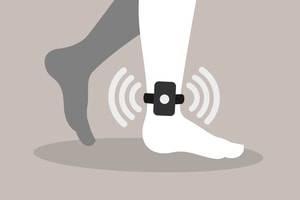Different Forms of Alcohol Monitoring Devices
 Texas courts can mandate that a defendant convicted for driving while intoxicated must use an ignition interlock device in his or her vehicle. The DWI offender must provide a breath sample in order to start the vehicle and continue to give samples periodically while driving. The device will report any sample that contains traces of alcohol to the court, which may punish the user for violating the terms of his or her probation. An ignition interlock is the most common type of alcohol monitoring device, but people suspected or convicted of DWI may be required to use other devices.
Texas courts can mandate that a defendant convicted for driving while intoxicated must use an ignition interlock device in his or her vehicle. The DWI offender must provide a breath sample in order to start the vehicle and continue to give samples periodically while driving. The device will report any sample that contains traces of alcohol to the court, which may punish the user for violating the terms of his or her probation. An ignition interlock is the most common type of alcohol monitoring device, but people suspected or convicted of DWI may be required to use other devices.
In-Home Testing
A court may order a DWI offender to use a portable alcohol monitoring device as an alternative to an ignition interlock device if the offender:
- Does not have his or her own vehicle;
- Shares his or her vehicle with others; or
- Has not complied with using the ignition interlock device.
A portable alcohol monitoring device can be hand-held or a slightly larger device that must be plugged into an outlet. The monitoring authority determines how frequently the user must provide breathe samples, and the test results are either transmitted immediately or uploaded from the device periodically. Items such as mouthwash or hand sanitizer can cause a false positive test result. The device manufacturers claim that these substances should not contaminate the breath sample if the subject waits for 15 to 20 minutes after using them.
Ankle Monitors
A court may require a subject to abstain from alcohol as a condition of his or her bail or probation. This drastic measure is most common when a subject:
- Is facing a felony DWI charge;
- Has multiple previous DWI convictions; or
- Has ignored orders to use alcohol monitoring devices.
The subject may be forced to wear an ankle bracelet in order to constantly monitor his or her blood alcohol levels. The device reads the subject’s sweat every 30 minutes for traces of alcohol. The device must detect alcohol for three-consecutive readings to conclude that the subject may have consumed alcohol. Having an ankle monitor can cost a user $300 to $400 per month.
Contact a San Antonio DWI Defense Lawyer
An alcohol monitoring device can help you retain some driving privileges during a DWI case and show the court that you can comply with its conditions. However, a false positive test result can cause legal problems. A San Antonio DWI defense attorney at the Law Offices of Sam H. Lock can dispute the accuracy of the device’s test results. Schedule your consultation by calling 210-226-0965.
Source:
https://www.responsibility.org/end-impaired-driving/solutions/punishment/continuous-alcohol-monitoring/





